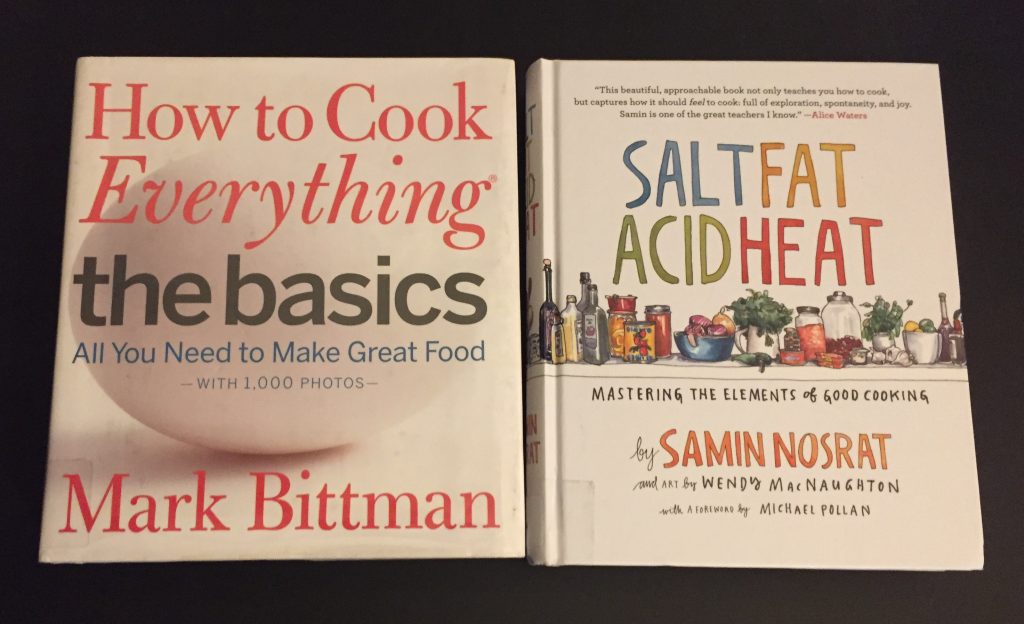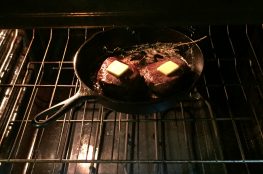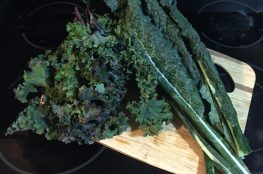It’s incredibly difficult to recommend cookbooks on Ditch The Ramen. If you’ve visited the resources page, you’ll notice that I’ve listed my favorites, but I haven’t recommended any particular text if you’re just starting out. The books I’ve learned from have various drawbacks that make them hard to recommend to an internet audience: no illustrations, for instance, or too many exotic ingredients. To offset this problem, I’ve posted about how you can choose a cookbook for yourself. But all the while I’ve been combing various channels to find something I could endorse without reservations. Today I present you with my findings: two cookbooks that I would wholeheartedly recommend to anyone learning to cook, both of which are thankfully available at my local library but which I find to be so valuable that I would still like to own my own copies. These winners are…

Though it’s pictured “second” in the photo, I’m going to start by discussing Samin Nosrat’s fabulous Salt, Fat, Acid, Heat: Mastering the Elements of Good Cooking. I wish this title had been in print when I first began to cook. Legendary chef Alice Waters is quoted on the front cover as saying, “Samin Nosrat is one of the great teachers I know,” and this statement basically sums up the book. Chef Nosrat’s writing is clear and engaging, and her explanations of how and why things work in the kitchen are so outstanding that I’ve had to abandon a number of ideas for posts, because after reading her explanations for various processes I thought, “Why reinvent the wheel? It’s explained better here and backed up by years of professional experience!”
In short, Chef Nosrat breaks down cooking into four key components (salt, fat, acid, and heat, for those of you who hadn’t guessed) and then unpacks both the science and the experience of working with each element. Her text is illustrated with drawings rather than photographs, and Wendy MacNaughton’s artwork adds a great deal. There are many helpful infographics showing, for example, the flavor profiles of different types of cuisine, which is seriously helpful if you have a hunk of ground lamb and you’re thinking Moroccan instead of Italian, or if you have a craving for Thai-style chicken but you have no idea how to get there. In addition unpacking the four elements in her title, Chef Nosrat also provides detailed instructions for several useful techniques (breaking down a chicken, making homemade mayonnaise and fixing it if it breaks, creating salad dressing from scratch, etc.). The back of the book contains actual recipes, which are less numerous than in other books but which still include favorites like chicken pot pie. If you’re looking for a book that will teach you how to think like a chef and move away from the need for cookbooks in general, this is the best I’ve seen.
In contrast, Mark Bittman’s How to Cook Everything: The Basics is a kind of encyclopedia for first-time cooks. Here, Bittman has taken every major process in the kitchen, broken it down into steps, then illustrated each step with photos. You can learn to make scrambled eggs and fried eggs and poached eggs and hard-boiled eggs and soft-boiled eggs, and you can look at a picture (or several) for each of these variations so you know if you’re on the right track. To the intense relief of any neophyte cook, Bittman takes nothing for granted. He includes pictures of water at a boil and water at a simmer to help you tell the difference. He offers five different cooking methods for asparagus and provides a photo of each one, along with a brief description of the texture and common uses. This book was first introduced to me by a friend who says she gives it to every couple she knows who is getting married, and I will probably start following suit.
The recipes in Bittman’s book aren’t limited to one-ingredient basics, either. Yes, you can make scrambled eggs, but you can also make pasta carbonara, fried rice, chicken soup, and plenty of other standard fare. This is the book to get if you have suddenly found yourself in a position where you have to cook regularly and you are in a blind panic. If you purchase this volume and follow it over the upcoming year, you’ll never be intimidated by your kitchen again. Moreover, Bittman is also the author of numerous other texts that are geared towards specific aspects of cooking (vegetarianism, baking, quick recipes, etc.). These do not contain the same meticulous photography as The Basics, but once you’ve mastered the concepts in this book you can then apply them to any number of follow-up projects from his other publications.
If you asked me to recommend one of these options over the other, I would ask about your learning style. If you like your teachers to tell you exactly what to do and how to do it, the Bittman is a better fit. If you are an independent learner who wants to figure things out on your own, get the Nosrat. But as I pointed out in the opening paragraph, I hope one day to own both. So if your friends and family are asking for gift ideas, send them the link to this post: they can’t go wrong with either one.*
* See legal notice below.
Legal Notice:
Ditch The Ramen is a participant in the Amazon Services LLC Associates Program, an affiliate advertising program
designed to provide a means for us to earn fees by linking to Amazon.com and affiliated sites.


